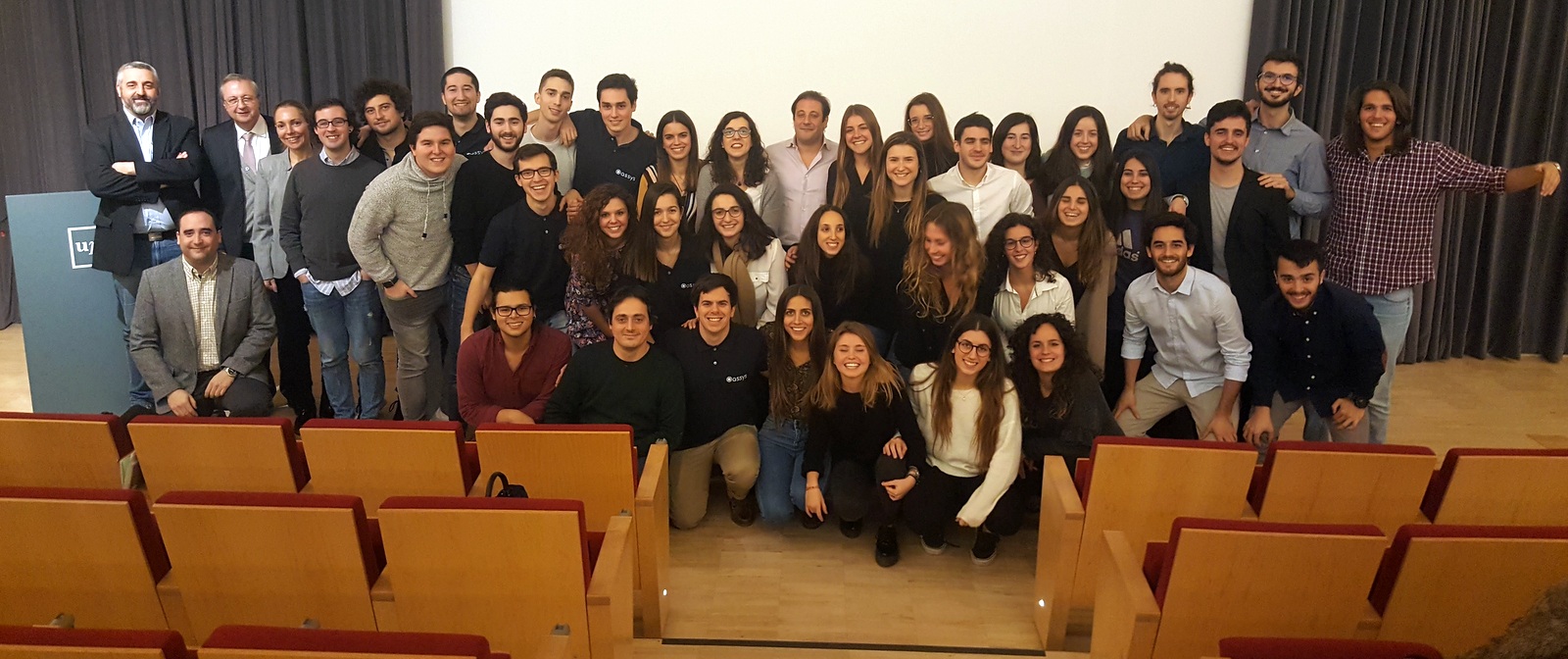Projects by young engineers that will change the way of practising medicine
Projects by young engineers that will change the way of practising medicine
On 4 December, students of the bachelor’s degree in Biomedical Engineering presented their proposals carried out within the framework of the sixth edition of the course “Introduction to Medical Devices and their Design”. A total of nine projects have been developed from an original idea to the end user and have benefitted from the advice of academic, clinical and business experts.
On 4 December, the presentation of the projects carried out by students at Pompeu Fabra University (UPF) on the bachelor’s degree in Biomedical Engineering took place within the sixth edition of the course Introduction to Medical Devices and their Design. The event was held at UPF’s Poblenou campus auditorium and was attended by both academics and representatives of companies and associations in the sector.
The main goal of this subject is for students to learn the process concerning the development of a medical device, from its conception and initial idea through to the marketing of the product, including the stages of computer-aided design, experimentation, clinical validation, market analysis and specific regulations, among others.
According to Oscar Camara, a member of the teaching staff, “the teaching method in this subject is active and focuses on empowering the students to develop their projects, where it is they who decide the basic problem they wish to solve and design and develop all related actions to build a proof of concept of the medical device worked on”.

Nine innovative projects
Oassys: oncology assistance system
Students: Ekain Arrieta, Belén Cantos, Eduardo Castañeda, Antton Lamarka, Joan Ribas
Partners: Mar Hospital, University of Murcia, GenesisCare
Oassys is a scalable and engaging mHealth platform that gives real-time updates of radiotherapy appointments and useful information about these procedures, in an easy and understandable way. It also provides direct contact with practitioners and adds questionnaires for patients to improve aftercare and therapy feedback.

B-tell: smart medical dressing for premature infection detection
Students: Minerva Gándara, Sergio Gómez, Nagore Izaguirre, Clàudia Miralles, Mar Moya
Partners: Mar Hospital, Sant Joan de Déu Hospital, UPF (Complex Systems Lab-CEXS), Nufesa electronics
B-tell is a device composed of an electrical circuit printed with conductive ink over a thin polymer for the detection of catheter-induced infection. This device, covered with a protective layer to prevent direct contact with the skin, is able to monitor changes in temperature that are indicated by lighting up a red LED to have a visual alert.
geLAAOtin: personalized left atrial appendage occlusion system with gelatin-based biomaterials
Students: Amaia Iribar, Anna Serra, Julia Pose, Ainhoa Aguado
Partners: Hospital Clínic de Barcelona, Hospital Sant Pau, Polytechnic University of Catalonia, University of Valladolid, Mondragon Unibertsitatea
geLAAOtin represents a new approach for the occlusion of the left atrial appendage, which is based on the introduction of biomaterials with high adherence properties to reduce the risk of thrombus formation.
Beaware: preventing babies from sudden death
Students: Paz Vila-Puig, Ariadna Reberté, Laura Sistach, Marta Ruscalleda
Partners: UPF (Systems Bioengineering-CEXS), Sant Joan de Déu Hospital
Beaware is a multi-platform device based on a pulsoximeter and temperature sensor for preventing cot death. It monitors different parameters and sends an alarm through an app when abnormalities are found.
MedCord: acquisition device for the screening of vocal cord disorders
Students: Beatriz Fernandez-Montells, Pablo Martí, Arnau Manasanch, Laura Madrenas
Partners: UPF (BERG-DTIC, MTG-DTIC), Mar Hospital
MedChord is a diagnostic tool based on accelerometer and microphone data that provides quantitative assessment of the vocal function. It aims to detect disorders related to the vocal cords in a novel non-invasive manner.
Neuromads-bMotion: rehabilitation system for hemiplegia based on an orthosis commanded by BCI
Students: Miguel Casal, Agustín Rovira, David Alonso, Santiago Galella
Partners: OpenBCI, NeurotechX, Neuroelectrics, UPF (Center for Brain and Cognition, Hacklab, MTG)
Neuromads-bMotion consists in a rehabilitation system for people suffering from hemiplegia, which is based on recovering the normal hand movement using a BCI (Brain Computer Interface). From the recordings of brain activity, the BCI detects the event of hand movement and makes an actuator perform it.
EpilepTech: portable, non-invasive and patient-specific device for seizure detection in patients with epilepsy
Students: Raquel Rodríguez, Mikel Domingo, Esther Motjer, Guillem Garcia
Partners: Mar Hospital, MJN Neuroserveis, UPF (BERG-DTIC), Associació Catalana de Malalts Epilèptics (ACME)
EpilepTech offers a portable, non-invasive and patient-specific device that can monitor EEG activity throughout the day. Combined with machine learning techniques, it can recognize seizure events and warn the caregiver. In addition, it provides useful information related to the seizures to doctors seeking a better follow up of the disease.
Kheirex-TactSense: bringing tactile feedback to laparoscopic surgery
Students: Edoardo Polo, Anna Manchón, Adolfo Aguirrezábal
Partners: Mar Hospital, UPF (BERG-DTIC)
TactSense by Kheirex is a one-use only, pressure-sensing laparoscopic grasper that gives the surgeon information about the pressure applied to the tissue during laparoscopic surgery in order to prevent tissue damage.
WELA: cost-effective wearable laparoscope
Students: Carla Sendra, Víctor Carmona, Roger Domingo, Ester Cavallé
Partners: Mar Hospital, Olympus, Hospital Clínic de Barcelona
WELA is a wearable laparoscope that makes laparoscopic surgeries more comfortable, giving more freedom of movement to the surgeon, by avoiding half of the large equipment needed and making it more accessible in areas of scarce infrastructure.
The assessment panel of the new proposals was made up of potential investors and clinical users: José Luis Fernández and Júlia López (FENIN, Federación Española de Empresas de Tecnología Sanitaria - Spanish Federation of Health Technology Companies, AB Medica), Mariano Barbero (Sorin-Livanova), Ayman Moghnieh (Alquimia), Marc Alameda (Electromedicine Service at Mar Hospital), and Oscar Camara, lecturer with the Department of Information and Communication Tecnologies (DTIC) at UPF.
